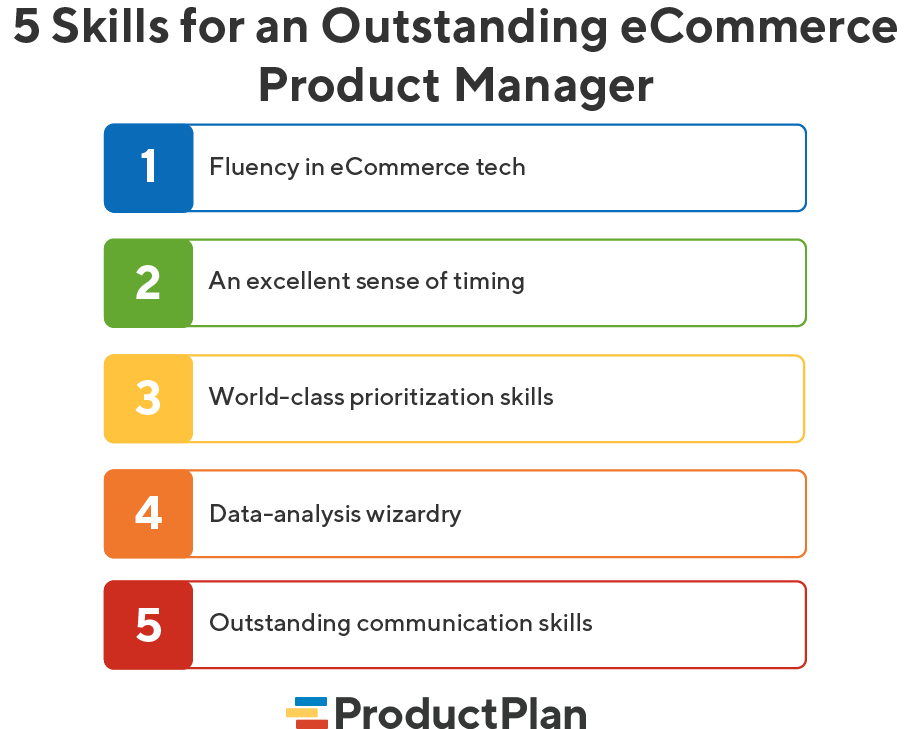Marketplaces like Amazon and eBay have built such outstanding online shopping experiences that consumers now take these experiences for granted. Creating a world-class eCommerce platform takes tremendous effort, teamwork, and strategic planning. For forward-thinking online retailers, this means hiring an eCommerce product manager.
What Is An eCommerce Product Manager’s Product?
Although the job description can vary from company to company and across industries, product managers all share at least a couple of common responsibilities. They drive the development of their company’s products. They own ultimate responsibility for the market success of those products.
For a company that makes high-end kitchen appliances, this role is relatively straightforward. The product manager will be responsible for the product strategy and development of the company’s kitchen appliances.
But in the case of an eCommerce company, the product manager’s role is less clear. Let’s say a retailer sets up an online store for musicians to buy instruments. This store includes noise-reducing headphones, recording equipment, etc. What is that eCommerce site’s product offering? What are they selling?
On the surface, the answer is obvious: Products for musicians. But that’s only partly accurate. Yes, an eCommerce platform is an online resource that helps shoppers and buys find a variety of products. But the company is also selling the market a different type of product: a high-quality online shopping experience. That experience is what an eCommerce product manager is responsible for overseeing.
Here are some of the most important skills you’ll need to succeed in this role.

5 Skills for an Outstanding eCommerce Product Manager
1. Fluency in eCommerce tech.
The overall user experience of an eCommerce website or app consists of many technological components. Here are just a few examples:
- The shopping cart, ordering, and payment-system applications
- Code is written to dynamically create a custom experience based on user, device, previous visits, etc.
- An inventory management system that syncs the site with current inventory details
- APIs that connect the site with the company’s shipping partners
- The site’s overall health and performance: speed, bandwidth, uptime, etc.
The eCommerce product manager has to make sure all of these details are in place, performing according to plan, and working together. If something goes wrong, the product manager needs to be able to grasp the underlying technical problem—to know how to get it fixed quickly.
We’ve written here at the ProductPlan blog that a product manager doesn’t need to be technical, even to manage technical products like software. But there are exceptions to this rule.
We’re not suggesting that to succeed as an eCommerce product manager you’ll need to learn to code. ECommerce is such a competitive industry. Customer tolerance is so low for problems during their online shopping experience. Due to this, a product manager will need thorough technical knowledge to be effective in this role.
2. An excellent sense of timing.
Prateep Krishnan, Director of Product Management at Xpanse Inc., provided ProductPlan with this must-have skill for eCommerce product managers.
As Prateep explained to us, eCommerce is a date- and event-driven industry. Product managers need to keep this in mind as they build their product roadmaps and release plans. The last thing an eCommerce company that sells floral arrangements wants is to discover is that a new feature they just released is bringing the site down… on Mother’s Day.
“You have to carefully plan, execute, and deliver your major features at least one quarter before [holidays and key events],” he said. “You also have to watch your usage metrics (conversion, session recording, dropouts, etc.) like a hawk and be on the lookout for any unexplained deviation in the weeks leading to those shopping days.”
One of our key takeaways from Prateep’s great insight was that eCommerce product managers will need to develop a strong sense of how long their team’s development cycles take. As well as how much lead time to factor in for various types of coding tasks. This will allow them to work backward in their strategic plans. In addition to building in enough time and resources for key releases ahead of those big shopping days and weeks each year.
When they develop their strategic roadmaps, eCommerce product managers will want to highlight the relevant major shopping dates—Valentine’s Day, Cyber Monday, the Holiday Season—prominently on those roadmaps.
3. World-class prioritization skills.
ECommerce product management involves a lot of juggling. You will always have more tasks, ideas, and requests on your backlog than the resources to complete them. When you add in Prateep’s point about having to devote additional focus to key shopping days and events, you can see where your time and resources will be even more limited at certain times throughout the year.
This means you will need to become highly skilled at prioritizing tasks, projects, and strategic goals. You will need to be able to conduct an objective, clinical assessment of competing user stories or enhancements for your eCommerce platform and make strategically sound, data-supported decisions on which items to work on first.
To learn more about adopting prioritization processes for impact, watch our webinar:
One best practice is to use a weighted scoring approach. Create a common set of criteria to evaluate all possible stories, features, bug fixes, etc., and then prioritize the development of the ones that score the highest.
For example, you might create several criteria to represent potential benefits—boosts revenue, increases customer loyalty. Then estimate a score for each of these categories for each competing item. Then you’ll do the same with potential risks: effort level, operational costs, etc.
Score every item on your potential to-do list against all of these criteria. You’ll tally up the totals to determine the projects most strategically advantageous to work on next for your eCommerce site.
As for those user stories, features, and enhancements that didn’t make it to the top of your priority list right now—but that your team believes are worth implementing? They’ll go on the backlog. You can add them to your sprint planning when your team frees up the time and resources, or when they’ve risen to the top of your strategic priority list.
4. Data-analysis wizardry.
According to 2019 research reported by eTailInsights, there are more than 7 million online retailers in the world and 1.8 million in the US alone. As an eCommerce product manager, you should always assume that you’ll have a lot of competition from other online retailers. Regardless of what type of product your company is selling.
The field is so competitive. Which places downward pressure on every online retailer’s prices. One of the few ways you’ll have to differentiate your eCommerce platform from others is the quality of your customer experience. That means you need to be testing, gathering, and analyzing data, and continuously applying your learnings to improve your site.
Here a few of the types of data you’ll want to be monitoring and using to improve your platform’s experience:
- Visitor bounce rates
- Average time on page
- Average user visits per day, week, month, etc.
- System health and performance levels
- Traffic patterns and trends by days of the week and various times of day
- How price changes affect campaign response rates, site visits, sales, etc.
- SEO keyword ROI
- ROI from email marketing and social media campaigns
- Average purchase amount per session
- Average purchase amount per user over a given period (say, each month)
- Your Net Promoter Score (NPS), customer reviews, and other user-generated feedback
This list could go on. But here’s the takeaway: You’ll want to be conducting A/B tests on many aspects of your eCommerce platform’s functionality and user experience, carefully studying your visitors’ behavior, and analyzing all of this data regularly.
To make your site more compelling and profitable, you’ll need to dig into the numbers to learn what’s working and what needs work.
5. Outstanding communication skills.
We’ve pointed out many times on this blog that every product manager needs to be a great communicator. There are several reasons for this. For example, product managers have to communicate their roadmap strategy to stakeholders, an important step in the process that can require both persuasiveness and finesse.
Also, because their work involves coordinating with many different teams across the company—engineering, sales, marketing, support, the executive staff—product managers need to know “developer-speak” and the unique languages of each department.
Finally, product managers need to be able to say no to requests on a regular basis—but without jeopardizing important relationships with colleagues and customers.
These realities all hold true for eCommerce product managers as well. But for this industry in particular, there is another reason that communication matters so much.
Takeaways
Unlike many products, an eCommerce platform is a living, frequently changing experience. Products change. Prices change. The layout and presentation of inventory changes. In fact, an eCommerce site or mobile app can create a different and unique experience every time a user visits its pages. In other words, an eCommerce website itself is a conversation.
One of the many strategic responsibilities of a product manager in this industry is to understand what each visitor to the eCommerce platform is “asking.” How the platform can “answer” in a way that is as concise, personalized, and compelling as possible for that user.
To put this another way, when you visit an eCommerce site that compels you to buy—indeed, makes you feel good about the purchase—you can be confident that behind that site is a great eCommerce product manager.






